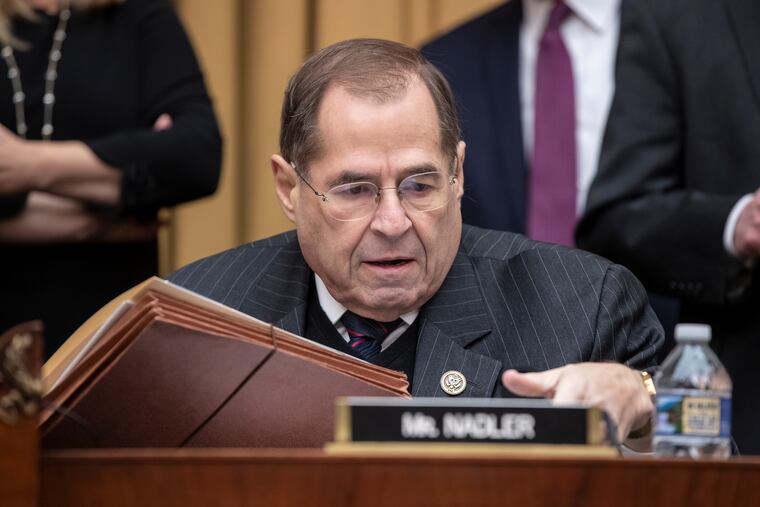Pledging ‘a new chapter,’ House Democrats hear pleas to address gun-violence crisis
Advocates pushed for the passage of a new universal background checks bill in the U.S. House and asked for other action to reduce gun violence.

A doctor, law enforcement personnel, and a witness to one of the nation’s worst mass shootings urged Congress on Wednesday to consider stricter gun-control measures, as House members convened their first hearing in eight years to address what most agree is an epidemic of gun violence.
“Congress for too long has done virtually nothing," Judiciary Committee Chairman Jerrold Nadler (D., N.Y.) said. "But now we begin a new chapter. … We may at last take real action to address this crisis.”
The hearing was another sign of House Democrats’ intention to make gun control a top issue now that they have control of the chamber. Lawmakers and activists pushed a universal background-check bill proposed by Democratic representatives, although Republican committee members said it would not work to stem the violence.
With nearly 40,000 Americans killed by guns in the United States in 2017, and high-profile mass shootings in the last few years inspiring renewed efforts, gun-control supporters have pushed a wide mix of proposals to address deaths and injuries from firearms.
“We’re at a critical moment where we can save the lives of thousands of Americans, and if we can, I think we must,” said Rep. Mary Gay Scanlon, a Democrat from Delaware County.
Democrats and a handful of Republican allies believe they can easily pass the background-checks bill in the House; advocates hope they can mount public pressure on the Republican-controlled Senate to at least give it a vote.
Online gun sales and purchases through private sellers are currently not subject to the background checks required for sales through a licensed gun dealer. The law seeks to require such a check for all sales, with exceptions for transfers between immediate family members and certain situations involving self defense or hunting.
The proposed law “will make it harder for dangerous people to get their hands on guns and hurt themselves or others,” said Robyn Thomas, executive director of the Giffords Law Center to Prevent Gun Violence, citing statistics that show most firearms obtained for crimes were from sources who were not required to run a background check.
Other witnesses, including a police chief and a sheriff’s unit commander, concurred with the idea that gun violence is a public health epidemic. They cited statistics showing that gun deaths in America are astronomically higher than in other similar countries, noted that guns are particularly dangerous for women with abusive partners, and said scientific research is needed to create evidence-based, multidisciplinary solutions to reducing deaths.
Aalayah Eastmond, who was shot at and saw two classmates killed last year at Marjory Stoneman Douglas High School in Parkland, Fla., told the committee members that “assault weapons and high capacity ammunition magazines belong on the battlefield.”
"My classmates and I have seen firsthand how uniquely lethal these weapons are,” said Eastmond, now a senior. “Rather than listen to special interests, I ask you to listen to the nation’s young people, and the overwhelming majority of Americans, who have had enough.”
Rep. Doug Collins of Georgia, the committee’s ranking Republican, said the background checks bill would not help.
“If we want to combat mass violence we have to address the human factors actually driving it,” Collins said, suggesting that Congress instead address mental-health issues. “We should, at minimum, commit to enforcing the laws we already have.”
Two other witnesses urged Congress not to do anything that would make it difficult for people to defend themselves.
“There are real people with real stories where being allowed to have their firearms would have saved them,” said Savannah Lindquist, a 24-year-old from Virginia who was raped in 2016 while attending Temple University, which does not allow students to carry firearms.
Joyce Malcom, a professor at the Antonin Scalia Law School at George Mason University, said public safety should be ensured through self-protection. Approving “tactics making it difficult for Americans to keep and carry weapons … is a serious infringement of their constitutional right and rather than improving public safety would make” people more vulnerable, she said.
At one point, the daylong hearing grew contentious when Florida Republican Matt Gaetz said violence perpetrated by undocumented immigrants was the problem and called for the building of a wall at the Mexican border. His comments drew shouts from the audience, including from the father of a Parkland victim and a query from Rhode Island Democrat David Cicilline about whether members of Congress were allowed to “make things up” and recite false statements.
Subsequently asked about immigration, Thomas of the Giffords Law Center said none of the country’s major mass shootings have been perpetrated by undocumented immigrants.
“There is no constitutional impediment to passing lifesaving gun laws. Since the founding of our country, gun rights have always gone hand in hand with gun regulations,” Thomas later said. “The only thing standing in the way of saving lives is the lack of political will.”